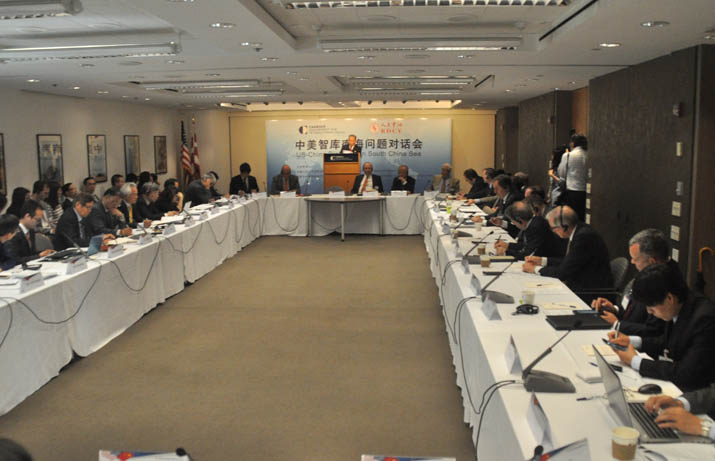
The U.S.-China Dialogue on South China Sea is in session on July 5 (DING YING)
During the U.S.-China Dialogue on South China Sea in Washington, D.C., on July 5-6, representatives from the two countries' think tanks exchanged views on hotly contested issues including the Philippines-initiated arbitration. Views from some U.S. participants follow:
 Douglas H. Paal (Vice President for Studies, Carnegie Endowment for International Peace): I think both sides could do a lot more to cool things down and it's my view that the July 12 deadline for the arbitration award should be viewed as a turning point to turn this from confrontation into cooperation, from adversity into advantage, by leading directly into a period of diplomatic efforts to calm the multiple sides in this dispute. I think there are ways of doing that.
Douglas H. Paal (Vice President for Studies, Carnegie Endowment for International Peace): I think both sides could do a lot more to cool things down and it's my view that the July 12 deadline for the arbitration award should be viewed as a turning point to turn this from confrontation into cooperation, from adversity into advantage, by leading directly into a period of diplomatic efforts to calm the multiple sides in this dispute. I think there are ways of doing that.
 David S. Sedney (senior associate, Center for Strategic and International Studies): I think the two sides' position is already very settled. So they are not going to change. The Chinese side's position is that the decision of the tribunal should be disregarded. The U.S. position is that it should be respected. I don't think there's any likelihood that either side would cede that position but it's important that both sides take steps to ensure that the disagreement is not elevated to conflict. So my recommendation is to set up a series of discussions at the high levels and mid-levels to discuss the whole range of issues regarding the South China Sea and those discussions take place before either side, anyone, takes any actions because actions taken at the time of a decision, actions taken at the time of high emotions, are likely to lead to escalation.
David S. Sedney (senior associate, Center for Strategic and International Studies): I think the two sides' position is already very settled. So they are not going to change. The Chinese side's position is that the decision of the tribunal should be disregarded. The U.S. position is that it should be respected. I don't think there's any likelihood that either side would cede that position but it's important that both sides take steps to ensure that the disagreement is not elevated to conflict. So my recommendation is to set up a series of discussions at the high levels and mid-levels to discuss the whole range of issues regarding the South China Sea and those discussions take place before either side, anyone, takes any actions because actions taken at the time of a decision, actions taken at the time of high emotions, are likely to lead to escalation.
 Brendan Mulvaney (instructor, U.S. Naval Academy): The South China Sea continues to be a sticking point but it does not overshadow all the other things that we are doing, the cooperation, so hopefully we can use some of those ways to maybe ameliorate the situation in the South China Sea and again in a couple of years we can do an agreement about how we're gonna handle incidents and see how we're gonna talk to each other and there are multiple reports of both ship captains from the American side and the Chinese side exercising these things, having friendly relations, passing each other and saying "hello" over the radio and having no problems. So I think that as long as we do a good job in continuing to explain that to the public we can decrease some of those perceived tensions.
Brendan Mulvaney (instructor, U.S. Naval Academy): The South China Sea continues to be a sticking point but it does not overshadow all the other things that we are doing, the cooperation, so hopefully we can use some of those ways to maybe ameliorate the situation in the South China Sea and again in a couple of years we can do an agreement about how we're gonna handle incidents and see how we're gonna talk to each other and there are multiple reports of both ship captains from the American side and the Chinese side exercising these things, having friendly relations, passing each other and saying "hello" over the radio and having no problems. So I think that as long as we do a good job in continuing to explain that to the public we can decrease some of those perceived tensions.
 Alan Romberg (distinguished fellow, Stimson Center): I think everybody agrees that there shouldn't be conflict. But tension is real. And there is a perception, I think among many in China, that the United States does take sides in, particularly, the sovereignty disputes, which it doesn't. So I think it takes some objective thought about the way people talk about the issue on both sides in terms of the United States and China and we'll have to see if that takes place.
Alan Romberg (distinguished fellow, Stimson Center): I think everybody agrees that there shouldn't be conflict. But tension is real. And there is a perception, I think among many in China, that the United States does take sides in, particularly, the sovereignty disputes, which it doesn't. So I think it takes some objective thought about the way people talk about the issue on both sides in terms of the United States and China and we'll have to see if that takes place.
(Reporting from Washington, D.C.)